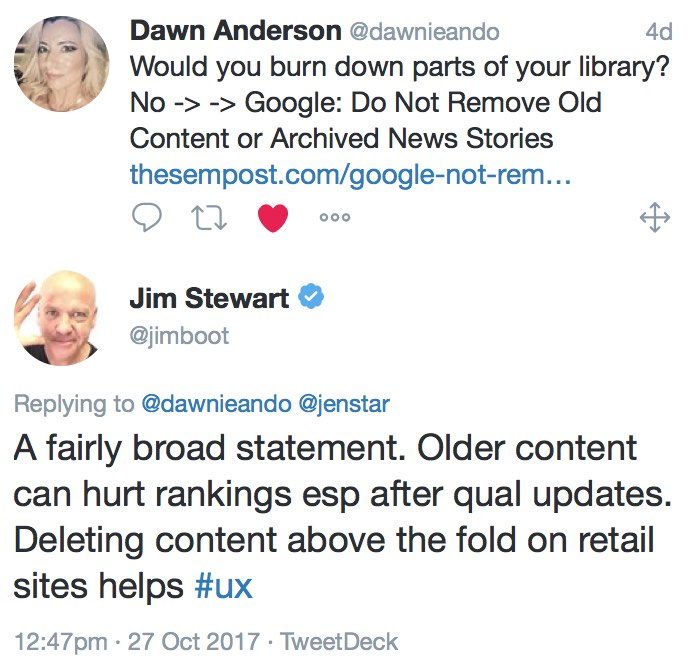SEO and Deleting Old Content
I saw a tweet during the week which made me raise an eyebrow when it comes to deleting content. Deleting content can help in certain circumstances. EDIT: Dawn’s tweet is on the money but many who hear or read Google’s comments may not understand the context.

What I learned
- Not all advice from Google is applicable to your site
- Blogs may not be best for retailers
- Pages need Expertise, Authoritativeness, and Trustworthiness
- Retailers should display products before content
- Reducing content can actually improve rankings
- The main content on a page should be industry relevant
SEO Resources in this show
Jen Slegg’s post over at The SEM Post
Google Search Rater’s Guidelines
Video Transcript
Welcome back Rankers! I want to talk to you about content this week. Now, next week in Vegas for Pubcon I’ll be talking about content marketing and I’d love to see you or meet you if you are there, so please come and hit me up. If this is your first time to the show, we’ve been going for 13 years, where have you been? Subscribe to the YouTube channel,
youtube.com/jimboot, there you go. Just subscribe to the channel and you can get weekly updates like everyone else has for the last 13 years. Look forward to seeing a few of you at Pubcon next week.
Old News
Okay, so during the week Jennifer Slegg of The SEM Post published an article about content and old content specifically. It was at the State of Search conference in Dallas and a big hello to Charmin, who is behind that, one of the people behind it anyway. The question was asked about removing older content. Now it’s important to understand the response from Gary Illyes, apparently that’s how you say his name, I didn’t know, sorry Gary. It’s important to understand the context of what they were talking about. The question was asked about removing old content and is that a good thing or a bad thing, but it was in the context they were talking about new sites.
Now, I think that this information taken out of context could be a little bit misleading and could get a few people maybe not having the best experience with their rankings as they possibly could. The reason is that Gary has said from Google’s perspective, I’m going to bluntly say no. What he’s saying is no, don’t delete old content, and I was always a big believer in that up until this year. Up until this year I was a big believer in don’t delete old content because you don’t know who’s backlinking to it, you don’t know what link use that article or that post is delivering to other pages in the site and my attitude was, if it’s not broken don’t fix it.
However, we have noticed a number of instances this year that by removing old content we can get rankings to go higher. Now there is, what Gary’s talking about in this context on the SEM post, they’re talking whole articles with new sites and they’re saying, if it’s a new site specifically you’re going to lose traffic if people are researching old articles or content and yes, I would agree, but what we’ve seen, especially with retailers actually, you know when we had to do content back in 2010 or ’12, we had to start writing blogs for retailers. I’m not necessarily a big fan of that now unless it’s for a specific task, for a target page or whatever it is.
I think that publishing blog posts may not be the best content strategy for your business. There may be other ones out there, it might just be like Dollar Shave Club doing an awesome ad, it might be Facebook groups, and it might be a whole bunch of other things that you can be doing to build your brand with content that doesn’t involve necessarily blog posts. Specifically Gary was saying about new sites, you’ll lose traffic if you get rid of all the articles.
What we’ve seen specifically with retailers though is that if you have a bunch of content on your category page for a group of products, if you have a bunch of content at the top of that category page and you’re pushing all your products down below the fold, well that’s a quality issue for the user because the user isn’t there to read that big piece of SEO content, usually. That’s on that category page. They’re not there for that. What we’ve found is that, and this goes to Google’s quality ratings guidelines as well. Google rater’s guidelines I should say.
Is Your Site E.A.T.able?
As well when they talk about EAT, which is E-A-T obviously, but it’s Expertise, Authoritativeness and Trustworthiness. Now trustworthiness is what we talked about last week, that’s a lot to do with brand or you can get trust by building a brand I should say. These other things that they talk about, expertise and authoritativeness, yep, fine, and this is when Google raters are basically evaluating a page. If that content that is on that retailer’s page, say for instance, or it’s an old blog post in a retailer’s page, is not great quality or doesn’t have great authority and the main content or the MC, as Google would say, of that page is like meh, and it’s not getting much traffic, why are we keeping it?
I’m not a big fan of that and specifically if you’ve got content above the fold on a category page for a retailer, we’ve found you’re better off basically conducting an experiment. Delete, like what I do, I deleted this one retailer, I deleted half the page content and that brought the products up a little bit, just above the fold. That also then increased rankings immediately after deleting that content for the keyword that we were tracking. We went up three or four spots on the front page, which is significant for a competitive phrase. Then I deleted more content, brought the products higher again up on the page and the rankings went up again for that phrase.
Wherever we see stories like this where we get this blanket from Google’s perspective, I’m bluntly going to say no, just remember the context of that information is delivered because we’ve found that another thing that we can do is actually go and delete old posts. I mean, I’ve got old posts from 2007 where I’m telling people how to backlink, I mean what’s their relevance any more, right? We don’t do it any more so there’s no relevance. Now if you just read that article you would say oh, well we need to keep everything. No you don’t, you got to think of this in the context of your own site and use logic, use common sense.
I know it’s not that common, but just use those sorts of things to go okay, well if I’ve got some blog posts from 2007 and they’re talking about backlinking, which we don’t do any more and we’ve run Screaming Frog across it, I mean Screaming Frog has got a great little ability where you could hook up Google Analytics to it and you can say, “Hey Google, show us all pages where there’s absolutely no Google Analytics data,” which will show you all pages that for the last 30 days that haven’t had traffic.
Now you can archive this data, you can go back longer if you want, I mean there’s a number of things that you can do, but you can find out the pages that are not getting traffic, have a look at the link structure or the nav structure. Do they play any major role in the keyword rankings that you’ve got? Well, what’s the point of having that piece of content there. If you’ve got a lot of those, that’s going to make your database bigger as well. If your database is bigger that’s going to slow down your site a little bit typically. There are all these sorts of other things taken into account when we read things like this and don’t just think that oh, Gary said we can’t delete content.
We’re going to lose traffic if we do. No, if you’re a new site maybe because it’s archived, but news is different from say your retailing site or say your lead generation site. They’re different things and my take on it is, if you don’t think that content is of quality, if it’s not getting traffic anymore and the link structure might be a bit meh, what’s the point in keeping it? Yeah, I would defer to Gary when it comes to new sites because I don’t, we’ve worked on a few new sites, but he’s probably worked them more than I have.
For normal sites or just sites that are retailing leads into business, those sorts of things, if you’ve got old content it’s probably a good idea to look at it and see if it’s worth keeping. See if it’s still relevant, freshen it up if it is and also just look at what the main content is on the page? Main content on the page can be different things for different industries, so main content on the page for a retailer would be the products. Main content on a blogger’s page would be the blog post.
All right, so main content can mean different things for different industries or categories or types of sites. What you need to focus on is making sure that that main content that you’ve got there for the user is a great user experience, it’s clear and it’s easily accessible, fast, all those sorts of things. Just make that experience great for the user. We will see you next week at Pubcon and we’ll be doing a show live from Vegas, might do it on Facebook Live. We’ll see you there. Thanks very much everyone. Bye.

Jim’s been here for a while, you know who he is.


